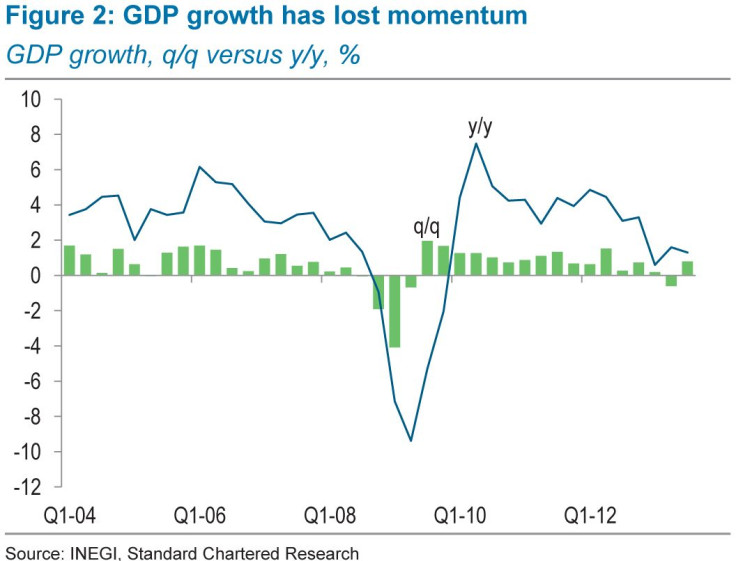Emerging Market Banking Sector Outlook: China, Vietnam, Kazakhstan, Mexico, the United Arab Emirates and Nigeria -IHS

Here’s a look at what economists at the IHS think are the key risks and developments for the emerging market banking sector in the month ahead, specifically for China, Vietnam, Kazakhstan, Mexico, the United Arab Emirates and Nigeria.
China – Tightening of inter-bank and shadow banking regulations; new financing through issuances of preferred shares and IPOs.
“China's banking regulators are expected to issue final inter-bank regulations that may limit each commercial bank's lending to other financial institutions up to 50 percent of its deposit base. While primarily targeting domestic banks that use inter-bank transactions as a regulatory loophole to engage in off-balance lending, the new rules, if introduced in the currently proposed form, may put greater funding pressure on foreign lenders, as inter-bank activities usually represent a larger share of foreign banks' liabilities than they do for domestic banks,” Ruta Cereskeviciute, senior economist at research firm IHS in London, said in a note.
China's State Council has prepared a new regulatory framework for the country's shadow banking industry that aims to limit banks' off-balance-sheet lending and to improve oversight of nonbank financial institutions.
Starting in January, China is set to launch a pilot scheme that allows companies to issue preferred stocks -- a capital-raising instrument that has priority over common stocks in distribution of profits and in the event of liquidation, but limits the preferred stock-holders' influence on decision-making. At the same time, banks will be allowed to use funds raised by issuing wealth management products to buy preferred shares in other companies. Authorities will also lift a ban on IPOs, thus providing banks with yet another capital-raising option, Cereskeviciute said.
Vietnam – The foreign-ownership cap for a single "strategic" investor in any Vietnamese bank is to rise to 20 percent from 15 percent.
Vietnam will allow foreign investors to take bigger stakes in the nation’s lenders starting next month, a move aimed at bolstering the ailing banking system but falls short of the reforms experts say are needed.
“The announcement marks only a small step towards foreign-ownership liberalisation in Vietnam's banking sector, especially given that individual investors were already able to reach a 20 percent limit by gaining special regulatory approval,” Cereskeviciute said, adding that overall, the country’s limits on foreign ownership in the banking sector remain rather tight.
A government decree announced on Tuesday said that effective Feb. 20 foreign banks could be allowed to buy majority stakes in domestic lenders considered weak and marginally greater shares than at present in stronger banks.
“Amid ongoing distress and numerous restructurings, the weakest banks especially are in urgent need of capital that domestic investors seem unable or not willing to provide. However, the authorities' reluctance to quickly open up the sector to foreign capital is understandable from the wider economic and political point of view, so no drastic changes are expected in the near to medium term,” Cereskeviciute said.
Kazakhstan – Details on Alliance Bank’s debt restructuring and change of ownership at BTA Bank.
Kazakhstan's Alliance Bank, controlled by the oil-rich nation's sovereign wealth fund, is in a dire financial position and will hold further talks with investors in January after announcing it would fail to repay a coupon maturing on Dec. 26, 2013.
The bank, according to an official presentation, "has entered into liquidity conservation mode to maintain its day-to-day business operations.” A next step is said to be an investors' meeting in mid-January, where an assessment of the bank's capital shortfall will be presented and recapitalisation options discussed, IHS economist Tomás Oliveira da Silva said.
Kazkommertsbank, Kazakhstan's largest bank by assets, announced in December that it is teaming up with businessman Kenes Rakishev to take control of BTA Bank as the state moves to reduce its stake in the bailed-out lender.
“The deal, which may be settled in the near term, would be another significant milestone in Kazakhstan's recent banking crisis history and would create a giant lender with more than one-fourth of total sector assets in the country,” Silva said.
Mexico – Kick-start of financial sector reforms.
After three years of strong economic growth, the Mexican economy slowed significantly in 2013 as both external and domestic demand suffered from a weaker U.S. economy and slower public spending.

On the bright side, a number of structural and political reforms that had been pending for 15 years were approved by the new administration addressing education, labor markets, telecoms competition, financial regulation, fiscal affairs, elections rules and energy.
“With Mexico's major financial reform having obtained parliamentary backing, local banking authorities will soon start to implement different parts of the ambitious legislative package aimed at boosting banks' role in the economy. Tangible effects in raising the banking sector's leverage in the economy and deepening credit penetration are likely to be gradual, however, with no excessive acceleration of lending or bank operations in the near term,” IHS senior economist Antonio Timoner-Salva said.
UAE – Further repayment of capital support by UAE banks to the government.
“Following a wave of crisis-support capital repayments in early 2013, another round of repayments could take place in the near term as a booming real estate sector in Dubai and improved growth prospects more broadly enhance banks' financial positions,” IHS senior economist Alyssa Grzelak said.
Furthermore, as part of the original agreement, UAE banks will gradually be forced to reduce the government bonds' contribution to Tier 2 capital from 80 percent in 2013 to 0 percent when the debt matures in 2017, increasing incentives to accelerate repayment.
Grzelak said Emirates NBD, the sector's largest bank and the largest single recipient of crisis support capital in 2009, is a likely candidate for additional repayment.
Nigeria – Details on appointment of Nigeria's new central bank governor and developments related to the reprivatisation of nationalised banks.
The outlook of Nigeria, the sub-Saharan Africa's largest market after South Africa, is clouded by political risks including the presidential elections next year, and a change in central bank governor this year.
The five-year term of Central Bank of Nigeria Governor Lamido Sanusi will end in June 2014. “Sanusi is seen as the architect of reforms that stabilised Nigeria’s banking sector, the removal of the minimum one-year holding period for offshore investors in FGN bonds, and a more credible anti-inflation policy with a commitment to FX stability,” Razia Khan, head of Africa research at Standard Chartered, said.
With Sanusi's term set to expire in June, authorities could further narrow down the short list of candidates being considered to take over the helm of the CBN upon his departure.
Six candidates from within the banking sector and central bank itself were previously listed by local media as being considered, although political upheaval within the country's ruling party could delay additional efforts on this front, Grzelak said.
“Meanwhile, the central bank could whittle down the list of prospective buyers for the first of three nationalised banks to be re-privatised,” she said. “Given the CBN's commitment to reducing risks in the sector and its publicly stated goal of attracting buyers with financial sector experience, the central bank is expected to prioritise bids received from foreign-owned banks.”
© Copyright IBTimes 2024. All rights reserved.






















